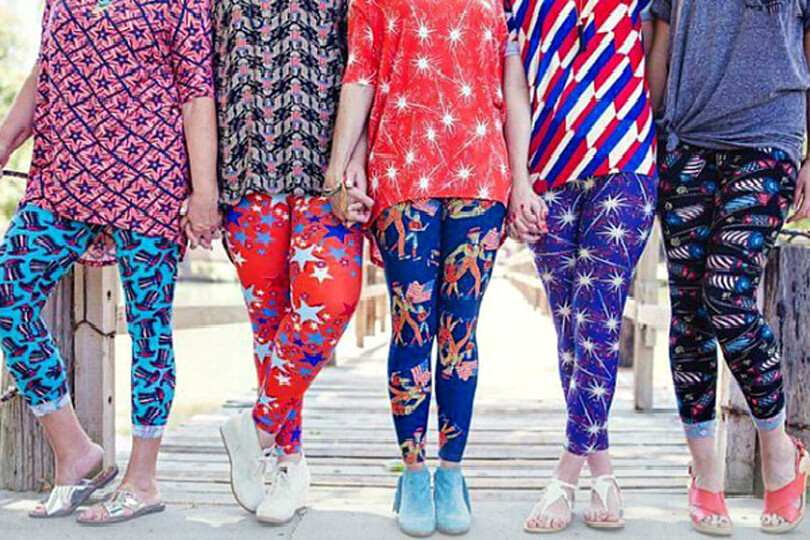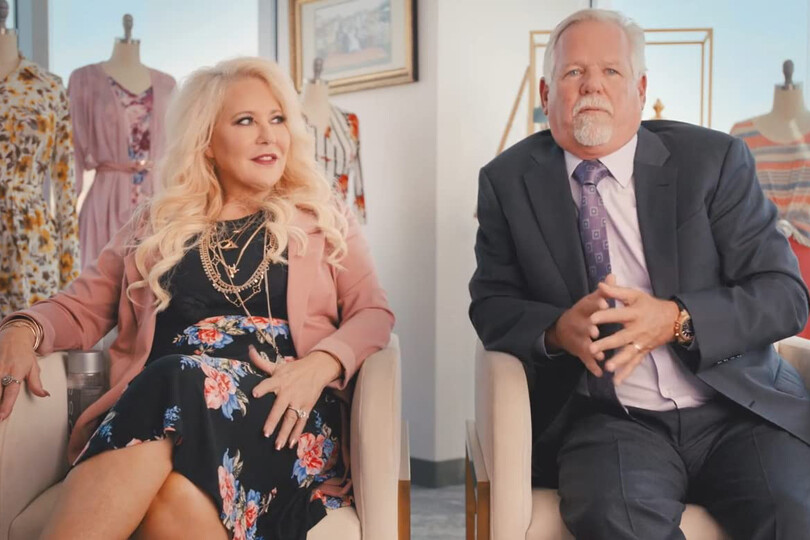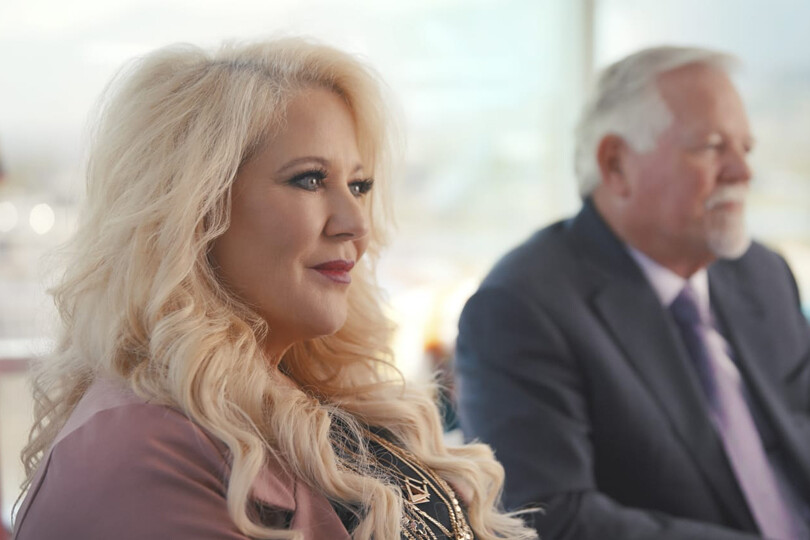By Michele Yeo
“Oh my God. I’m in a cult.”
So realizes Roberta Blevins in LuLaRich a four-part documentary series exploring the meteoric rise and lawsuit-laden fall of clothing empire LuLaRoe. Roberta was one of the company’s top-earning and most loyal sales consultants, a veritable walking endorsement for the brand until the blindfold eventually slipped and the curtain lifted, exposing LulaRoe for what it truly is: a pyramid scheme masquerading as a legitimate business, a scam targeting women with the promise of empowerment, personal autonomy, financial freedom, and all the other #GirlPower #GirlBoss #BossBabe meaningless platitudes that are standard operating procedure for these types of high level grifts. Whether they’re selling leggings like LuLaRoe, skincare like Arbonne, haircare like Monat, or the promise of being thin like Herbalife, all these companies are essentially peddling the same thing: bullshit.
LuLaRich, currently streaming on Amazon Prime Video, certainly makes LuLaRoe seem like one of the worst offenders in a Sophie’s Choice-style selection of sophisticated scammers. The docuseries introduces us to company founders DeAnne and Mark Stidham, a married couple whose blended families come together in Brady Bunch-like fashion. That is, if Carol and Mike Brady, after having tied the knot, adopted additional children and two of those children went on to marry EACH OTHER. Yes, two of their children, though not blood-related, married each other. The Stidhams gloss over this fun family fact in the first ten minutes of episode one as if it’s perfectly normal (the only acceptable pairing up of non blood-related siblings, by the way, is Cher and Josh from Clueless and even then, that’s only because resisting Paul Rudd’s charms is literally illegal) The truly terrifying thing is, the coupling up of the Stidham siblings isn’t even close to the most bonkers thing exposed in LuLaRich.

The series documents LuLaRoe’s humble beginnings with DeAnne selling maxi skirts out of the trunk of her car, then shifting to a Tupperware-like business model, hosting in-home dress parties before recruiting a small group of consultants to buy product from her and sell it at a markup, and ultimately transforming her hustle into a billion-dollar empire. How the demand for what are some of the fugliest, most heinous-looking leggings ever manufactured, each pair more tacky than the one before it fueled such a successful business is far too baffling a topic to tackle within the confines of this piece, but taste, after all, is subjective. What’s not subjective, however, is how LuLaRoe set its sights on recruiting certain types of women into its er, triangle-shaped business model. More often than not, young moms looking to make money whilst remaining at home with their children, military wives on the move, or just women looking for purpose or to belong to something were prime targets, sold on how they could make a ton of cash with minimal effort, the old “work smarter, not harder” mentality, lured in by the notion that working for LuLuRoe was like belonging to a family, a family that offered cruises, trips, and private Katy Perry and Kelly Clarkson concerts as incentives. Incentives that don’t come free, by the way, most consultants pay to attend. For a long time, the seduction worked and becoming a LuLaRoe “sponsor” (what the company called an entry-level consultant, with “mentor” being the ultimate goal) became a hot ticket. The doc reveals the lengths to which some women would go in order to secure the funds to buy-in to the company with some even selling off their own breast milk to afford product which came with a price tag of anywhere from five to ten thousand dollars. As with many pyramid schemes, consultants are tricked into believing they’re “small business owners” rather than mere cogs in a massive multi-level manipulation and that buying their own product is an investment in said small business. If you’ve ever followed someone involved in an MLM on social media, you know the great pains to which they go to convince you, and themselves, of their small business ownership. These indoctrinated women constantly take to Facebook, Instagram, and Twitter (often at the MLM’s encouragement) to let you know how much they’re killing it at their small businesses and being their own #BossBabe. LuLaRoe consultants were encouraged to have about 20 thousand dollars worth of product in their inventory at any given time.
But like all pyramid schemes, only those who get in early stand a chance of making any real money and even then, it’s mostly through the recruitment of “downlines” not actual selling of the product. Those who were successful in LuLaRoe did make some real money, with some women earning in the neighbourhood of 20 thousand dollars in bonuses per month. But that wasn’t as lucrative as one might think, with the high level earners heavily encouraged to live beyond their means, flaunting new cars, designer goods, and expensive vacations on social media as another way to entice and recruit more downlines with dreams of living that luxe LuLaRoe life. Even more nefarious, after getting the procedure herself, DeAnne would strongly encourage her more high-profile mentors to travel to Tijuana to undergo gastric bypass surgery in an effort to project a certain image. Thinning is winning, I suppose? DeAnne successfully recruited at least 18 LuLaRoe ladies to undergo the extremely invasive procedure at the Tijuana clinic from which she must have certainly been earning some sort of kickback.
When the company expanded too far too fast (eventually ballooning to more than 80 thousand consultants in the US) and the demand for product became nearly impossible with which to keep up, its quality suffered, eventually making it extremely difficult for everyone from entry level sponsors to high level mentors to move the cheaply-made, sometimes even smelly or moldy leggings. The leggings went from merely tacky to downright toxic. When consultants, some of whom had tens of thousands of dollars of product piling up in their garages expressed concern, owners DeAnne and Mark put the blame on consultants themselves, employing the tried and true tactic of toxic positivity to gaslight them into believing their negativity was to blame, they just weren’t working effectively enough, didn’t want it bad enough, weren’t hustling hard enough to make their small businesses a success. It certainly couldn’t have been the boxes of ugly ass, cheaply-made leggings that allegedly smelled like Satan’s farts.

LuLaRich is just the latest entry in what’s become a genre of schadenfreudian content: watching scammers spectacularly fall from grace. The Fyre Festival debacle spawned two full-length documentaries and authors, documentarians, journalists, and podcasters have been dining out regularly on Elizabeth Holmes since it was revealed the former Forbes magazine cover girl and Steve Jobs cosplay queen once lauded as a revolutionary and Silicon Valley savant for her blood-testing technology company Theranos, was nothing but a grade A grifter who swindled investors out of millions of dollars with the promise of revolutionizing medical diagnostics. Elizabeth Holmes, of course, is currently on trial for fraud.
One can only hope the popularity of this content makes it more difficult for the next scam artist, pyramid schemer, or gifted grifter to find their mark as people become more wise to the bullshit bill of goods they’re being sold. Followers have even soured on Rachel Hollis, the best-selling author and blockbuster motivational speaker who built a multi-million dollar empire out of essentially yelling meaningless inspirational quotes at an arena full of people. Go girl! Give us nothing! Rachel spent years marketing herself as an authentic every woman whose massive success was achievable to anyone if they just wanted it badly enough (anyone with a Disney exec husband’s salary to fall back on, of course) Rachel fell from grace earlier this year after posting a bizarre TikTok video proudly declaring herself to be unrelatable to us unwashed masses and comparing herself to women like Harriet Tubman and Maya Angelou in the caption. Admitting you’re privileged and unrelatable is one thing, it’s an entirely different thing when you’ve amassed your millions positioning yourself as just that: relatable. Girl, give your head a shake.
Rachel was already on shaky ground with her supporters after announcing her impending divorce from husband and business partner Dave Hollis. The breakup of a marriage shouldn’t feel like a gut punch to anyone other than the two people inside that marriage but darling Dave and relatable Rachel had long positioned themselves as the perfect couple, hosting podcasts and expensive weekend conferences designed to teach other couples how to be as happy and functional as them. Turns out admitting they had been on shaky ground and contemplating divorce for years (while pocketing people’s money) was bad for business.
Now that we’re all a little bit smarter and more sophisticated about how these snake oil salespeople like Rachel Hollis, and DeAnne and Mark Stidham operate, let’s stop giving them our hard-earned money, yes?












